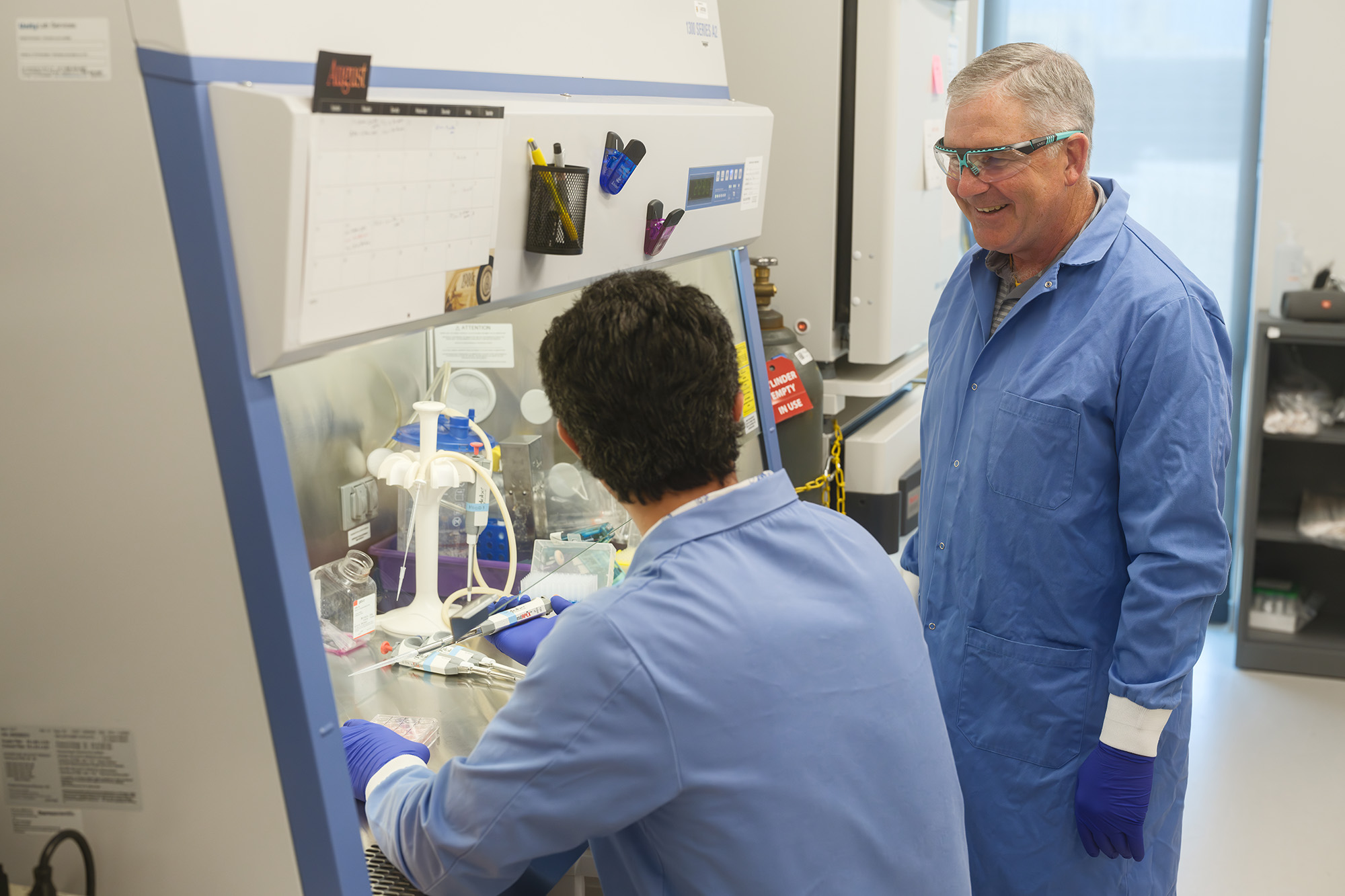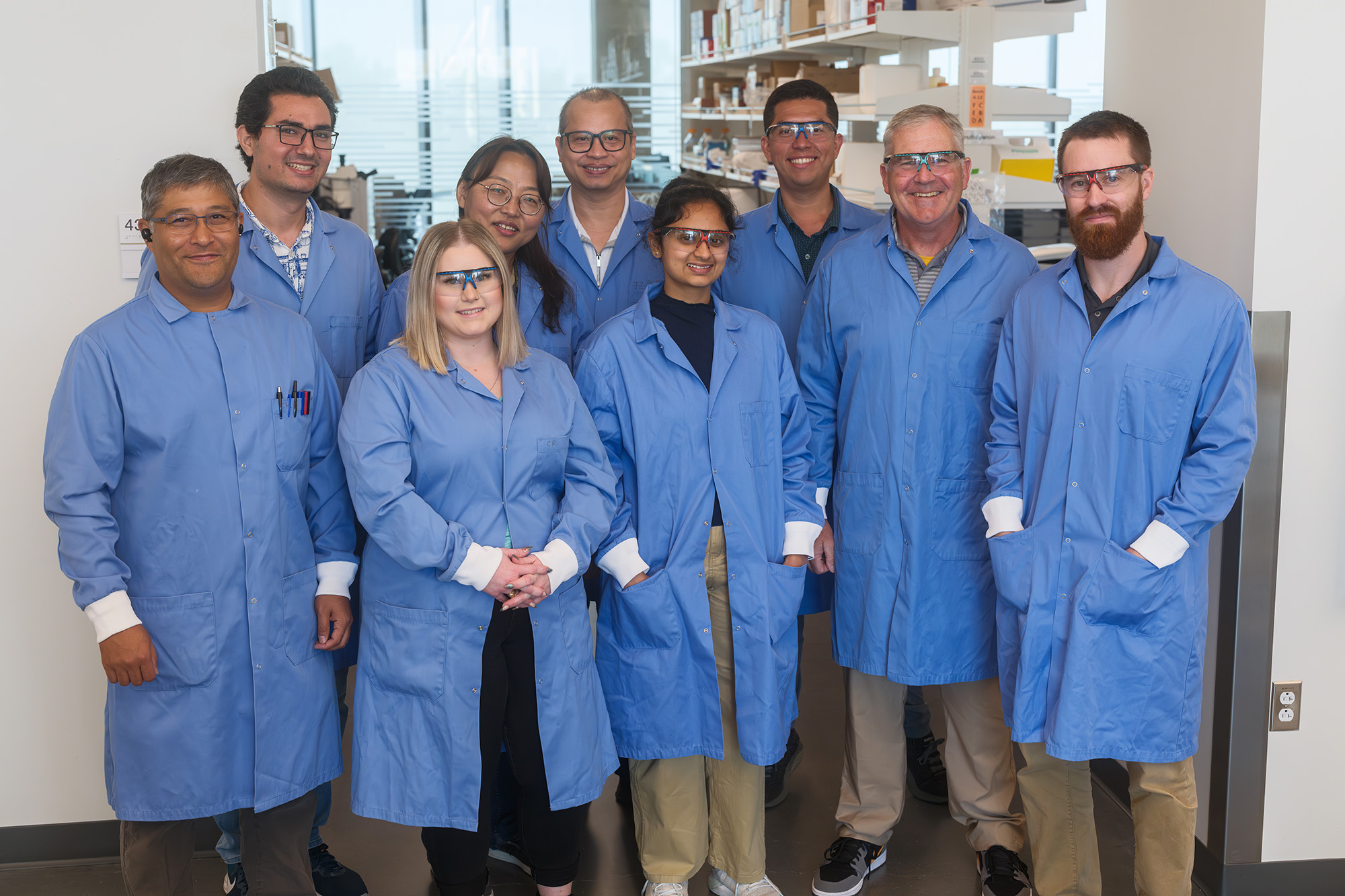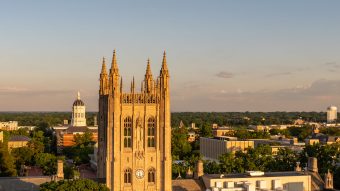
Sept. 10, 2024
Contact: Courtney Perrett, cperrett@missouri.edu
Photos by Ben Stewart
Gathered on the fourth floor of the University of Missouri’s Roy Blunt NextGen Precision Health building, Tom Spencer and a team of researchers huddle around a microscope. They’re examining endometrial organoids — a three-dimensional tissue culture system that helps them research the glands of the uterus.
As Mizzou’s Vice Chancellor for Research, Spencer knows that the most innovative discoveries hinge on teamwork. That’s why he’s leading a team to work on his latest project, which is funded by a National Institutes of Health (NIH) MERIT Award.
That award stands for "method to extend research in time" and is a 10-year project that will total more than $6 million in funding support. It is a prestigious award by the NIH designed to provide stable, long-term funding support to outstanding, experienced investigators whose productivity is distinctly superior and who are deemed highly likely to continue to perform their research activities in an outstanding manner. For Spencer, this investment by the NIH signifies his dedication to reproductive biology research focused on improving women’s health.
“If you look at Mizzou’s research expenditures, they've grown substantially over the past five years,” said Spencer, a Curators’ Distinguished Professor in the College of Agriculture, Food and Natural Resources’ Division of Animal Sciences and NextGen Precision Health investigator. “A large amount of that growth in research expenditures at Mizzou is due to the National Institutes of Health, which is the agency that granted us this MERIT award to continue building on years of scientific research on the female reproductive system.”
Inducted into the National Academy of Sciences in 2019, Spencer is internationally regarded for his research in reproduction and developmental biology with a focus on the uterus and placenta. With the support of this latest award, he is set to continue striving for advancement in this space for years to come.
Decades in the making
Spencer started his career in the 1980s as an undergraduate researcher and then graduate student at Auburn University. There, he became fascinated with the intricacies of the reproductive system — specifically, the uterus.
Drawn by the opportunity to join the nation’s premier Animal Science program, Spencer came to Mizzou in 2015, where he’s excelled in his role and is now setting an example for researchers to do their own groundbreaking research across campus.
“Over my career, I’ve developed and led teams that have made amazing discoveries” Spencer said. “For instance, our lab was the first to discover that the glands in the uterus are essential for pregnancy success. We were also one of the first labs in the world to show that there are viruses in the placenta of mammals that are critical for its development.”
As an animal scientist at his core, Spencer has focused for decades on reproduction in sheep and cattle. Spencer is passionate about animal health and hopes his research on the biology of pregnancy will help solve the grand challenges that influence the health of livestock.
Spencer’s research also focuses on reproduction in humans. In his inquiry into the structure and function of uterine glands, Spencer has laid the foundation for studying the specific mechanisms that encourage pregnancy in women and contribute to uterine cancer and endometriosis — conditions that affect the health of up to 30% of women globally.

Building a legacy
Receiving the MERIT award is emblematic of what Spencer deeply values about Mizzou: a place where people lead by example.
“Mizzou is home to a community of talented, trailblazing researchers who serve both as leadership and have active, extramurally funded research programs,” Spencer said, highlighting leaders in the MU Division of Research, Innovation and Impact such as Chris Lorson, Susan Renoe and Wendy Reinke as well as the NextGen Precision Health initiative led by W. David Arnold, and School of Medicine led by Richard Barohn, Bettina Mittendorfer and R. Scott Rector.
For Spencer, giving back means setting a precedent. He enjoys collaborating with fellow researchers, mentoring early- and mid-career scientists, and continuing to advance dual-purpose research that will undoubtedly impact the health of women and animals. The MERIT award, a testament to hard work and dedication, is a fitting next step.



